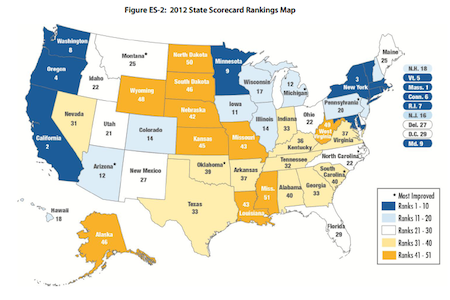ACEEE’s 2012 State Energy Efficiency Scorecard Has Your Number

ACEEE’s 2012 State Energy Efficiency Scorecard came out last week, and if you haven’t seen it yet, download it now and have a look. Massachusetts, which stole the top spot from California last year, held onto the title of the most energy efficient state in the country. The top 10 states are all the same, with a bit of position shifting between 6 and 10. The state at number 51, the bottom, is no longer North Dakota; it’s Mississippi.
ACEEE’s 2012 State Energy Efficiency Scorecard came out last week, and if you haven’t seen it yet, download it now and have a look. Massachusetts, which stole the top spot from California last year, held onto the title of the most energy efficient state in the country. The top 10 states are all the same, with a bit of position shifting between 6 and 10. The state at number 51, the bottom, is no longer North Dakota; it’s Mississippi.
Same as last year, the rankings are based on how states are doing with their energy policy in these 6 areas:
- Utility and public benefits programs and policies (20)
- Transportation policies (9)
- Building energy codes (7)
- Combined heat and power (5)
- State government initiatives (7)
- Appliance efficiency standards (2)
Each category was worth the number of points shown in parentheses above, and if a state got the maximum in each category, their total score was 50 points. Massachusetts ended up with 43.5 points total, 2 points lower than last year but still enough to beat California by 3 points, doubling its margin from last year.
Georgia moved up slightly, from #36 to #33, but it’s still pretty pathetic. I bragged about our ranking in building energy codes last year (6.5 out of 7) but we’ve slipped there, dropping to 5.5 out of 7. Despite the drop in points, we’re still tied for 6th place in the country in that category. In the biggest category, utility and public benefits programs and policies, Georgia still gets only an anemic 1.5 points. I guess Georgia Power didn’t care about my attempt to shame them here in the Energy Vanguard Blog last year.
Two states had double-digit changes in position, both states that start with the letter M and both ended in the same spot. Montana moved up 10 notches and gets the award for the biggest gain. Maine dropped an astounding 13 spots. Both states had 19 points out of 50 and are tied for number 25.
Maine! What’s going on up there? I love you guys, but you may be in worse trouble than we are in Georgia. The ACEEE report says, “Maine’s apparent weakening of support for energy efficiency is of particular concern because of its laudable history of increasing efficiency budgets.”
Here are ACEEE’s top recommendations for states to improve their energy efficiency:
- Adopt and fund an energy efficiency resource standard.
- Update building energy codes and get utilities involved in energy code compliance.
- Reduce tailpipe emissions and set targets to reduce vehicle miles traveled.
- Treat combined heat and power as an energy efficiency resource equivalent to other efficiency resources.
- Fund state government led efficiency incentive programs; set policies that benchmark building energy use; and invest in energy efficiency research and development and demonstration projects.
ACEEE does a great job with this kind of analysis and if you want to understand what’s happening and where, you really should go download and read the report. Its 179 pages (up 57 from last year) are loaded with good info. (You’ll have to create a free account there first, but ACEEE is a great organization.)
Related Articles
Where Does Your State Rank in Energy Efficiency? ACEEE Can Tell You
This Post Has 3 Comments
Comments are closed.

[Disclaimer: I’m not in the
[Disclaimer: I’m not in the energy industry — just a home-owner building a new house.]
I’m a libertarian-leaning conservative, so this sounds like a State Intrusion Scorecard in many respects. Some of what they score on is commendable, but some of it is not, in my book.
What I’d most like to see is the realtors, appraisers, and lending industry standardize the inclusion of energy efficiency features into the appraisal and lending practices.
Cameron M.
Cameron M.: I can see how it might look like a government intrusion scorecard. Of course, it’s also government intrusion when the state expands or builds roads, helps utilities use eminent domain to take land for power lines, or gives tax breaks and access to cheap investment capital to utilities. By helping to increase energy efficiency, we all benefit in a number of ways. A quote from the report summarizes it best:
“Energy effiency improvements help businesses, governments, and consumers meet their needs by using less energy, saving them money, driving investment across all sectors of the economy, creating much needed jobs, and reducing environmental impacts.”
I try not to get into
I try not to get into politics , i am not Dem or repub , lib right left blah blah blah , i am American dont belong to no party’s am also a Veteran OIF 2 and 4 , i think this is a good thing , conserv energy , things should run at there best with minimal consumption and Least amount of discharge or cleaner discharge , like to see more “score boards ” to me shows who gives a crap and who isnt interested in positive change , those party’s so concerned who right who wrong , whats best for the party’s is all that matters, dont wanna turn this thread into political garbage but For the people by the people , um what is that , for the party , by the party is how things operate today , anything that brings attention to keeping people safe and reducing costs most of the time is a good thing